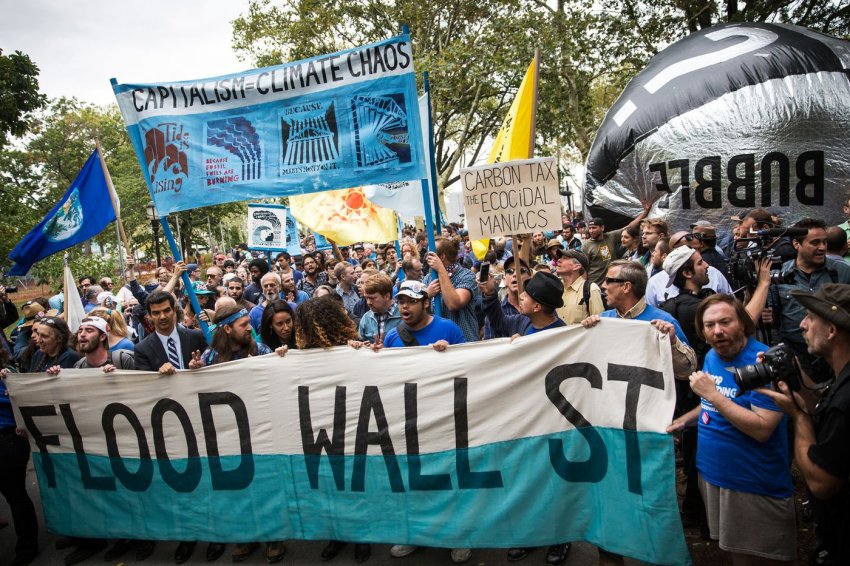
When renowned ecosocialist Ian Angus came to Australia in 2011 he observed that for most people it is “easier to imagine the end of the world than to imagine the end of capitalism”.
Unfortunately, imagining the end of the world is getting easier. There are almost daily reports of the accumulating effects of climate change, to choose just one source of potential apocalypse.
The need for urgent action was highlighted in a June call for a six-point plan to “turn the tide” in carbon emissions over the next three years. The plan cited an April report by a range of respected climate research institutions that said the temperature goals set in Paris become “almost unattainable” if “emissions continue to rise beyond 2020, or even remain level”.
Such calls for urgent action are not new. David Suzuki at the time said the 1990s had to be the “turn around decade”. Many campaigners claimed that the (ultimately failed) 2009 Copenhagen climate talks were the “last chance” for meaningful climate action.
It is easy to become paralysed into inaction when the “last chance” calls for urgent action come and go and by most measures things, such as emissions increases, continue to get worse.
In this climate, there is a certain attraction to the message of professional doomsayers such as Essex University lecturer Nicholas Beuret who wrote not only “it is too late” but also “it might even make you feel better” to say so.
The problem is that such messages are profoundly demobilising when it is far from clear that we have actually passed the point of no return. They pose no threat to the corporate elites who are responsible for the mess we're in.
Take for instance the sober paper Our Children's Burden: requirement of negative CO2 emissions published in October last year.It was authored by respected climate scientist James Hansen and eleven colleagues.
It argued that the planet is already “as warm as it was during [an earlier period] when sea level reached 6–9 metres higher than today”. Targets for limiting global warming should “at a minimum” aim to limit this warming and that “such targets now require 'negative emissions', i.e. extraction of CO2 from the air.”
Crucially the paper argues that “if phasedown of fossil fuel emissions begins soon”, relatively benign measures such as reforestation and agricultural measures to improve carbon content in the soil may be enough to reduce CO2 sufficiently.
In such a case, the “magnitude and duration of global temperature [increase above safe levels] could be limited and irreversible climate impacts could be minimised”.
In an October interview, Hansen said: “If we reduce emissions 5 or 6 per cent a year we could get back to 350ppm [that is reduce CO2 concentrations in the atmosphere] by the end of this century”.
In other words, it is not “too late”.
However we are currently skating close to the edge and the only solution is a rapid reduction in carbon emissions starting as soon as possible. This needs to be combined with reforestation and other measures to draw down CO2 that is already in the atmosphere.
When the scientific imperative is so clear, and has been for a long time, one is forced to pose the question: why are emissions still rising? Why isn't more being done?
In Australia, as in other countries, we're still going in the wrong direction. State and federal governments are supporting the Adani coalmine, paying subsidies to prop up polluting industries and have inadequate or nonexistent policies for reducing fossil fuel use.
This is not an accident. It is a fundamental and inevitable feature of the capitalist system which protects corporate profitability above all else — literally: above all else.
Fortunately, there is an alternative — democratic socialism — and a realistic plan to achieve it.
The plan involves organising today to win victories against capitalist injustice (“Stop Adani”, “Evacuate Manus”) while at the same time pointing towards a new society based on human solidarity and social justice (“People before profit”).
The political and economic power of big corporations has to be defeated and replaced by the democratic and popular power of “the 99%”.
Such a plan is not an optional extra. We need to organise for it today. Ending capitalism is an imperative if we are to prevent the end of the world.
[Alex Bainbridge is a national co-convenor of the Socialist Alliance.]
Like the article? Subscribe to Green Left now! You can also like us on Facebook and follow us on Twitter.